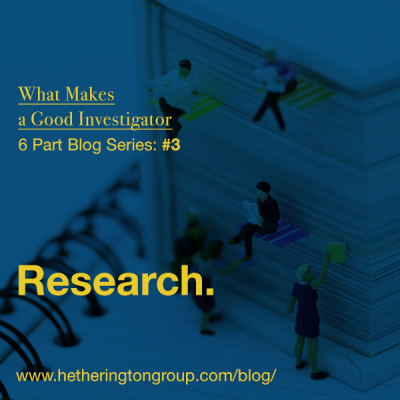By Cynthia Hetherington

Research
Without a fundamental application of the principles of CRAWL, an investigator may have a short career, because she or he will not see return business, will become frustrated over inconsistent reports, and will not understand why the phone is not ringing. In this 6-part blog series, we will teach newbies how to CRAWL and help seasoned investigators refine their skills. Last week we explored the Logistics of Communicating. This week we discuss Research.
Introduction to Research
Research is one of those words that can mean one thing to one person and something else to another. “Research” covers a lot of areas. The topic is too broad to accurately describe what you do and what you produce. When I tell people I’m a “researcher,” they tend to look for a white coat hanging on a peg in my office or lab animals in cages. The title “investigative researcher” makes you think of journalists and investigative reporters. And “librarian researcher’ puts an academic spin on the title.
Research is strictly the process that you undertake to achieve an answer. It could be as complex as nuclear physics or as straightforward as asking a question of the town assessor.
To be clear, investigative research is the task undertaken by “an investigator, analyst or researcher” to locate information that creates, supports, or makes his case. How he or she goes about this will depend a lot on the type of case. With investigations being as varied as the areas they cover, let us narrow the basic research functions to the following four types of investigations:
- Investigative Due Diligence
- Competitive Intelligence
- Background Research
- Online Intelligence
During the interview with your client, you will come to understand the nature of your project and which of these will be necessary to deliver the information your client seeks.
Investigative Due Diligence is conducted for projects such as mergers and acquisitions, pre-acquisition, vendor or supply alliances or any type of corporate background that requires you to know everything about a certain company, including its principals and the factors that affect its products.
Competitive Intelligence, sometimes called business or competitor intelligence, is crystal-ball research. In part, it is investigative due diligence with an emphasis on the future. The goal of competitive intelligence is usually either to gather data so a company can learn about it competition or to help a company bring a new product to the market place. Much of the investigation is a strategic examination of strengths, weaknesses, product offerings, pricing, markets served, prospects, suppliers, distributors, and competitors. You also could conduct traditional research and make some analytical predictions based on your knowledge of the companies, the market, and the facts as you understand them.
Background Research encompasses many fields such as pre-employment verification and market research. It is broader in scope and usually is a combination of several companies or persons being examined.
Online Investigations include Open Source Intelligence (OSINT) and Dark Web Intelligence. OSINT entails researching overt, publicly available sources on the Internet, including but not limited to newsrooms, chat boards, social media platforms, RSS feeds, public records, personal Websites, and other Internet protocols. The scope of Dark Web investigations often concerns criminality, anonymity, counterfeit products, child pornography, and human trafficking in Dark Web channels.
Watch for Imponderables
The specific type of investigation will give you a sense of the kinds of deliverables the client is expecting, the services you will need to enlist to perform your research, and the approximate amount of time it will take. However, be prepared for a bump in the road on time management. For example, if you are working on foreign corporate research, check a calendar from that country to ensure that there are no unforeseen holidays and days off. If you are unaware whether government buildings are closed will likely make you look unprepared for a rush assignment.

Are you an analyst or investigator looking for introductory training on conducting OSINT investigations? If so, check out Hg’s recorded webinar, Online Social Media Primer Series. This introductory primer series will teach you why to use these platforms, how to get into them, where to look, what nuances and leads you need to chase down, and how they are all interrelated. We’ll also discuss how to capture content per service, so you can present it in your reports.
 With over twenty-five years of global experience in open source investigations and one of the first investigative firms to conduct online social media investigations, Hetherington Group develops advanced cyber investigations unique to your needs. Learn how Hg’s analysts can clear through jargon and uncover answers buried deep in open sources, social media pages, and Dark Web sites.
With over twenty-five years of global experience in open source investigations and one of the first investigative firms to conduct online social media investigations, Hetherington Group develops advanced cyber investigations unique to your needs. Learn how Hg’s analysts can clear through jargon and uncover answers buried deep in open sources, social media pages, and Dark Web sites.
 Cynthia Hetherington, MLS, MSM, CFE, CII is the founder and president of Hetherington Group, a consulting, publishing, and training firm that leads in due diligence, corporate intelligence, and cyber investigations by keeping pace with the latest security threats and assessments. She has authored three books on how to conduct investigations, is the publisher of the newsletter, Data2know: Internet and Online Intelligence, and annually trains thousands of investigators, security professionals, attorneys, accountants, auditors, military intelligence professionals, and federal, state, and local agencies on best practices in the public and private sectors.
Cynthia Hetherington, MLS, MSM, CFE, CII is the founder and president of Hetherington Group, a consulting, publishing, and training firm that leads in due diligence, corporate intelligence, and cyber investigations by keeping pace with the latest security threats and assessments. She has authored three books on how to conduct investigations, is the publisher of the newsletter, Data2know: Internet and Online Intelligence, and annually trains thousands of investigators, security professionals, attorneys, accountants, auditors, military intelligence professionals, and federal, state, and local agencies on best practices in the public and private sectors.



